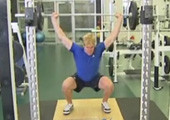A hockey game takes place not only on the ice but also in the brain, therefore, mental hockey training is vital if you want to concentrate while playing. Hockey players have expectations of the game’s result: how it looks in their imaginations and how it will probably finish. These expectations are either based on positive mental strategy or thinking that is self-defeating, according to Dr. Patrick Cohn of Hockey Psychology Tips.
Training Thought Patterns
One of the biggest mistakes players make in Dr. Cohn’s opinion is that they set expectations that are unrealistically high. While it is possible for a goalie to block every shot, it is also likely he will not. Will the goalie fall apart as soon as he lets a goal in and his dream is destroyed, or will he be prepared to move on and play his best game?
If he sets smaller expectations, he will recover. In the days and minutes before the game, he can focus on:
- maintaining or improving little elements of his game
- his equipment: is it optimal?
Furthermore, with positive mental hockey training, he can teach himself to fix mistakes in practice time, but boost his self-confidence on game day by focusing on his strengths and achievements.
Where Does Ice Hockey Mental Training Start?
Mental hockey training is a daily thing. While ice time and fitness training sessions are finite, there is no way to switch off a player’s mind. This is one important reason why he cannot spend too much time thinking negative thoughts. They would consume him and eat up his self-confidence. This would be devastating to his game and his off-ice relationships as well.
Appropriate Time for Mental Hockey Training
- Immediately after a game
- During a team de-briefing session
- During the days leading up to another game
- Game day and several minutes before
Some players perform small rituals like eating the same foods or wearing the same sweaty socks. Some pray before going out onto the ice. Most professionals can be seen quietly thinking and honing their focus in the last minutes. They are not usually laughing and chatting.
Turning Negative Thinking into Positive Reinforcement
Dr. Cohn also writes that negative thinking or a negative emotional reaction can be turned around. For some players, nerves become anxiety and even come with physical symptoms. A player might feel nauseous, fail to sleep, or suffer in other ways. This anxiety is a result of:
- Extremely high expectations
- A feeling of failure following a bad performance
- A fear that a winning streak will suddenly fail
What a player can do, suggest Dr. Cohn, is turn anxiety into a positive force. A mentally strong hockey player will use mental hockey training to harness those emotions and become excited about going out on the ice and showing what he can do.
If you want to take your game to the next level, you will obviously need mental hockey training, but there is other important preparation that takes place before you step on the ice. Learn more about HockeyOT’s dryland hockey training program and maximize your potential.














